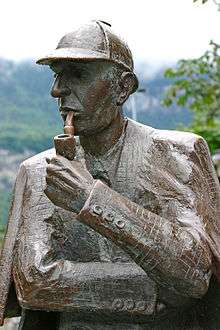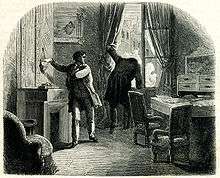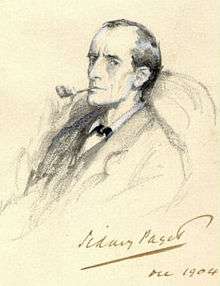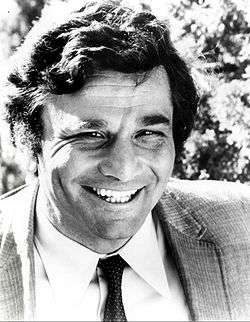Fictional detectives
Fictional detectives are characters in detective fiction. These individuals have long been a staple of detective mystery crime fiction, particularly in detective novels and short stories. Much of early detective fiction was written during the "Golden Age of Detective Fiction" (1920s–1930s). These detectives include amateurs, private investigators and professional policemen. They are often popularized as individual characters rather than parts of the fictional work in which they appear. Stories involving individual detectives are well-suited to dramatic presentation, resulting in many popular theatre, television, and movie characters.
The first famous detective in fiction was Edgar Allan Poe's C. Auguste Dupin.[1] Later, Sir Arthur Conan Doyle's Sherlock Holmes became the most famous example and remains so to this day. The detectives are often accompanied by a Dr. Watson–like assistant or narrator. However, in several of her novels where he appears, Agatha Christie gives reference to Hercule Poirot being the greatest detective in all the world.
Types
Fictional detectives generally fit one of four archetypes:
- The amateur detective (Miss Marple, Jessica Fletcher, Lord Peter Wimsey); From outside the field of criminal investigation, but gifted with knowledge, curiosity, desire for justice, etc.
- The private investigator (Cordelia, Holmes, Marlowe, Spade, Poirot, Magnum, Millhone); Works professionally in criminal and civic investigations, but outside the criminal justice system.
- The police detective (Dalgliesh, Kojak, Morse, Columbo, Alleyn, Maigret); Part of an official investigative body, charged with solving crimes.
- The forensic specialist (Scarpetta, Quincy, Cracker, CSI teams, Thorndyke); Affiliated with investigative body, officially tasked with specialized scientific results rather than solving the crime as a whole.
Notable fictional detectives and their creators include:
Amateur detectives
- Misir Ali – part-time professor of psychology at University of Dhaka, created by Humayun Ahmed
- Arjun – young detective from Jalpaiguri in West Bengal, created by Samaresh Majumdar
- P. K. Basu – criminal lawyer, created by Narayan Sanyal
- Trixie Belden – teen detective, created by Julie Campbell Tatham
- Boston Blackie – reformed jewel thief, created by Jack Boyle
- Rosemary Boxer – with Laura Thyme, gardening detective, created by Brian Eastman
- Beatrice Adela Lestrange Bradley – widowed socialite, created by Gladys Mitchell
- Father Brown – Catholic priest, created by English novelist G. K. Chesterton. Stars in 51 detective short stories
- Encyclopedia Brown – boy detective Leroy Brown, nicknamed "Encyclopedia" for his intelligence and range of knowledge.
- Cadfael – early 12th-century monk solves murders and social problems, created by Ellis Peters, also known as Edith Pargeter.
- Jonathan Creek – creative consultant to a magician, in a British TV series by the same name, written by David Renwick.
- Nancy Drew – High school sleuth, created by Edward Stratemeyer.
- C. Auguste Dupin – upper class character created by Edgar Allan Poe. Dupin made his first appearance in Poe's "The Murders in the Rue Morgue" (1841), widely considered the first detective fiction story.[2]
- Dr Gideon Fell – "lexicographer" and drinker, created by John Dickson Carr
- Jessica Fletcher – writer, created by William Link and Richard Levinson for Murder, She Wrote TV series (1984–1996)
- Pandab Goenda – team of five child detectives, created by Sasthipada Chattopadhyay
- Gogol – teenage detective, created by Samaresh Basu
- Beverly Gray – protagonist of the Beverly Gray Mystery series by Clair Blank
- The Hardy Boys – Sibling high school sleuths, (Frank & Joe) created by Edward Stratemeyer.
- Jonathan & Jennifer Hart – millionaire couple, created by Sidney Sheldon
- Patrick Jane – con artist, created by Bruno Heller for The Mentalist TV series
- Jagga Jasoos – young detective, created by Anurag Basu for the eponymous film
- Jayanta & Manik – amateur detective duo created by Bengali novelist Hemendra Kumar Roy
- Kakababu – former director of the Archaeological Survey of India, created by Sunil Gangopadhyay
- Sally Lockhart – teenage girl, created by Philip Pullman
- Miss Marple – a small town old spinster who solves a number of crimes using common sense, created by Agatha Christie
- Veronica Mars – school girl whose father is a private detective, created by Rob Thomas
- Amelia Peabody – Egyptologist who solves a variety of dastardly crimes in turn-of-the-century Egypt, created by Elizabeth Peters.
- Ellery Queen – author and editor of a magazine, created by two writers, using the pseudonym Ellery Queen
- Easy Rawlins – black WWII veteran from Houston. All stories take place in Los Angeles during the 50s & 60s. Created by Walter Mosley.
- Joseph Rouletabille – journalist created by French writer Gaston Leroux. Main character in The Mystery of the Yellow Room.
- Niladri Sarkar – retired Colonel, naturist and amateur investigator, created by Bengali writer Syed Mustafa Siraj
- Laura Thyme – with Rosemary Boxer, gardening detective, created by Brian Eastman
- Dr. John Thorndyke – medical doctor who trained to become a forensic specialist, created by R. Austin Freeman
- Philip Trent – gentleman sleuth, created by E. C. Bentley
- Professor Augustus S. F. X. Van Dusen – created by Jacques Futrelle
- Hetty Wainthropp – retired working-class woman, created by David Cook
- Lord Peter Wimsey – wealthy English gentleman, created by Dorothy L. Sayers, assisted by his valet (and batman from WW1) Bunter and then Harriet Vane
Private investigators

- David Addison in Moonlighting – created by Glenn Gordon Caron
- Angel – Vampire with a soul and private investigator in Los Angeles
- Byomkesh Bakshi – created by Sharadindu Bandyopadhyay
- Goenda Baradacharan – created by Shirshendu Mukhopadhyay
- Parashor Barma – created by Premendra Mitra
- Batman – World's Greatest Detective in the DC Universe – created by Bob Kane and Bill Finger
- Tommy and Tuppence Beresford – created by Agatha Christie
- Jackson Brodie – created by Kate Atkinson
- Nestor Burma – created by Léo Malet
- Albert Campion – created by Margery Allingham
- Pepe Carvalho – created by Manuel Vázquez Montalbán
- Richard Castle – Very successful novelist and private investigator
- Nick & Nora Charles – created by Dashiell Hammett
- Dipak Chatterjee – created by Swapan Kumar
- Elvis Cole – created by Robert Crais
- Bulldog Drummond – created by H. C. McNeile
- Feluda – created by Satyajit Ray
- Phryne Fisher – created by Kerry Greenwood
- Garret – created by Glen Cook
- Cordelia Gray – created by P. D. James
- Peter Gunn – created by Blake Edwards
- Mike Hammer – created by Mickey Spillane
- Madelyn "Maddie" Hayes in Moonlighting – created by Glenn Gordon Caron
- Mitin Masi – created by Suchitra Bhattacharya
- Sherlock Holmes – created by Sir Arthur Conan Doyle
- Jack Irish – created by Peter Temple
- Jake Lassiter – created by Paul Levine
- Bernie Little – in the Chet and Bernie Mystery Series, created by Spencer Quinn
- L. Lawliet – created by Tsugumi Ohba and Takeshi Obata
- Thomas Magnum – created by Donald P. Bellisario for Magnum, P.I. TV series
- Joe Mannix – created by Richard Levinson and William Link for Mannix TV series
- Philip Marlowe – created by Raymond Chandler
- Veronica Mars – created by Rob Thomas TV Series (books based on TV Series. Movie based on TV series)
- Kinsey Millhone – created by Sue Grafton for her "alphabet mysteries" series of novels.
- Tess Monaghan, created by Laura Lippman
- Adrian Monk – created by Andy Breckman for Monk TV series
- Lucifer Morningstar – Former King of Hell and successful nightclub owner and private investigator
- Kogoro Mori, created by Gosho Aoyama
- Bhaduri Moshai – created by Nirendranath Chakraborty
- Hercule Poirot – created by Agatha Christie
- Precious Ramotswe – created by Alexander McCall Smith
- Jeff Randall – created by Dennis Spooner for Randall and Hopkirk (Deceased) TV series
- Jim Rockford – created by Roy Huggins and Stephen J. Cannell for The Rockford Files TV series
- Kiriti Roy – created by Indian dermatologist and a popular Bengali novelist Nihar Ranjan Gupta
- John Shaft – created by Ernest Tidyman
- Sam Spade – created by Dashiell Hammett
- Shawn Spencer and Burton Guster – created by Steve Franks for Psych TV series
- Spenser – created by Robert B. Parker
- Remington Steele – created by Robert Butler, Michael Gleason for Remington Steele TV series
- Jake Styles – created by Dean Hargrove and Joel Steiger for Jake and the Fatman TV series
- Cormoran Strike – created by Robert Galbraith (a pen name of J.K. Rowling)
- Philo Vance – created by S. S. Van Dine
- V. I. Warshawski – created by Sara Paretsky
- Nero Wolfe – created by Rex Stout
- The Continental Op – created by Dashiell Hammett
- Matt Houston – created by Lawrence Gordon
Police detectives
- Furuhata Ninzaburō – created by Kōki Mitani, a Japanese version of Columbo
- Thomson and Thompson – from The Adventures of Tintin, created by Hergé
- Judge Dee – 18th century Chinese fictionalized magistrate with later editions by Robert van Gulik
- Inspector Roderick Alleyn – created by Ngaio Marsh
- 87th Precinct detectives – created by Ed McBain
- Superintendent Battle – created by Agatha Christie
- Napoleon Bonaparte (Bony) – created by Arthur Upfield
- Harry Bosch – created by Michael Connelly
- Charlie Chan – created by Earl Derr Biggers
- Inspector Clouseau – from The Pink Panther franchise
- Columbo – from the American TV series Columbo, created by William Link and Richard Levinson
- Popeye Doyle – based on the real Detective Eddie Egan
- Sergeant Cork – created by Ted Willis
- Inspector Adam Dalgleish – created by P. D. James
- Inspector French (Joseph French) – created by Freeman Wills Crofts
- Inspector Frost – created by R. D. Wingfield
- D.C.S. Christopher Foyle – from the British TV series Foyle's War, created by Anthony Horowitz
- Inspector Japp – created by Agatha Christie
- Richard Jury – created by mystery author Martha Grimes
- Lt. Theo Kojak – TV series (played by Telly Savalas)
- Inspector Lestrade – created by Sir Arthur Conan Doyle
- Judge Bao – Chinese judge and investigator
- Chief Inspector Robert Macdonald – created by E.C.R. Lorac
- Steve McGarrett – Hawaii Five-O TV series
- Jules Maigret – created by Georges Simenon
- Adrian Monk – created by Andy Breckman and David Hoberman
- Inspector Morse – created by Colin Dexter
- Detective William Murdoch – created by Maureen Jennings
- Inspector Rebus – created by Ian Rankin
- Dave Robicheaux – created by James Lee Burke
- Inspector Simon Serrailler – created by Susan Hill
- Dick Tracy – created by Chester Gould
- Inspector Wallander – created by Henning Mankell
- Chief Inspector Armand Gamache – created by Louise Penny
- Shabor Dasgupta – created by Shirshendu Mukhopadhyay
- Inspector Alan Grant – created by Josephine Tey
Forensic specialists
- Temperance Brennan – Bones TV series based on the books by Kathy Reichs
- Donald "Ducky" Mallard – N.C.I.S. TV series
- Dexter Morgan – Dexter TV series
- Henry Morgan – Forever TV series immortal medical examiner and private investigator
- Dr. Lancelot Priestly – created by John Rhode
- Dr. R. Quincy – Quincy, M.E. TV series
- Lincoln Rhyme and Amelia Sachs – created by Jeffery Deaver [8]
- Elizabeth Rodgers – Law & Order TV series
- Dr. Kay Scarpetta – created by Patricia Cornwell
- Abby Sciuto – N.C.I.S. TV series
- Dr. John Thorndyke – created by R. Austin Freeman
- Bruce Wayne – Batman comics and adaptions
- Barry Allen – Flash comics and adaptions
CSI: Crime Scene Investigation TV shows
- Stella Bonasera – CSI: NY TV series
- Horatio Caine – CSI: Miami TV series
- Jo Danville – CSI: NY TV series
- Calleigh Duquesne – CSI: Miami TV series
- Gil Grissom – CSI: Crime Scene Investigation TV series
- Raymond Langston – CSI: Crime Scene Investigation TV series
- D. B. Russell – CSI: Crime Scene Investigation TV series
- Mac Taylor – CSI: NY TV series
- Catherine Willows – CSI: Crime Scene Investigation TV series
Anime and manga
- Hajime Kindaichi – character from the manga and anime series Kindaichi Case Files.[9]
- Shinichi Kudo/Conan Edogawa – protagonist of Gosho Aoyama's series Case Closed, which is known in Japan as Meitantei Conan.[10]
- L – a detective featured in the Death Note series created by Tsugumi Ohba and Takeshi Obata
- Alice – protagonist of Kamisama no memochou, a NEET Detective.
- Sou Touma – main character of the Q.E.D. series created and produced by Motohiro Katou.
- Kyoko Kirigiri – character in Danganronpa: Trigger Happy Havoc known as the "Ultimate Detective".
- Shuichi Saihara – character in Danganronpa V3: Killing Harmony known as the 'Ultimate Detective".
- Naoto Shirogane – character in Persona 4 who is lonely, has a 200 level IQ, has insecurities on her age and her gender, and is the Detective Prince. Her weapon of choice is a handgun, mostly a revolver. She is currently voiced by Mary Elizabeth McGlynn.
- Goro Akechi – character in Persona 5 who is the charismatic, lonely and wanting to be at the centre of attention at all times, pancake loving , black mask wearing, Second Advent of the Detective Prince. His Metaverse weapons of choice are, a chainsaw sword, a laser sabre, a serrated blade, and a ray gun. He is currently voiced by Robbie Daymond
- Dick Gumshoe – character from the manga and video game series Ace Attorney.
See also
- Crime fiction
- List of male detective characters
- List of female detective characters
- List of fictional historical detectives
- List of fictional detective teams
- List of fictional detectives for younger readers
- List of fictional science fiction and fantasy detectives
- List of detectives, constables, and agents in Sherlock Holmes
- Spy film
Notes
- Silverman,Kenneth (1991). Edgar A. Poe: Mournful and Never-ending Remembrance. New York: Harper Perennial. ISBN 0-06-092331-8.
- Silverman 1991, p. 171
- "Definition of Sherlock in Oxford Dictionaries (British & World English)". oxforddictionaries.com. Retrieved 15 March 2013.
- "Best fictional detectives". latimes. Retrieved 15 March 2013.
- "Natalie Haynes's guide to TV detectives: #1 – Columbo". London: guardian.co.uk. 23 January 2012. Retrieved 15 March 2013.
- "Clued In: The Top 10 Television Detectives". Time. 4 May 2012. Retrieved 15 March 2013.
- "〈beランキング〉心に残る名探偵". 朝日新聞. Retrieved 15 March 2013.
- http://www.jefferydeaver.com/novels/series-order/
- "Kindaichi Case Files 2008 New Anime" (in Japanese). Tokyo MX. Retrieved 2010-02-07.
- "Case Closed FAQ". Funimation. Archived from the original on March 27, 2004. Retrieved October 3, 2010.
References
- Julian Symons. The Great Detectives: Seven Original Investigation,1981,ISBN 0810909782


